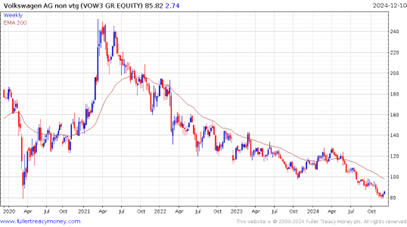I don’t mind admitting I have a bug bear with build-in redundancy. I had a little tirade about my recent experience with Google Nest at the end of a recent video – and I have some observations about Volkswagen AG (VWAGY) and its shares, says Eoin Treacy, editor of Fuller Treacy Money.
I received this email from a subscriber after the video: “Your comment on build-in redundancy being a massive turnoff is very well made.”
The first time I really became aware of the trend was when I was speaking with the owner of the patent on elevator door sensors. He and his two partners supply most of the door sensors to the world’s elevators. They intentionally engineer them to ensure a ready supply of fresh customers for repairs.
A couple of years later, I spoke with a motor mechanic. He related the story of how Audi had changed the coding on their parts. Before 2014, you could buy an OEM part on eBay and install it yourself or have a mechanic do it.
Then Volkswagen changed the coding of their parts. Only those sold by registered dealerships would be compatible with the onboard computer. That meant the OEM part might function correctly, but it would not clear the error code. In one fell swoop, they created more demand for in-dealership servicing.

The threat from China and EVs is not the only reason for the demise of the German automotive sector. The companies took their market share for granted and thought of their customers as cash registers rather than people.
Value is a precious commodity in the hearts and minds of consumers. When people feel like they are being squeezed, they rebel.
Volkswagen is currently trading at the same level as where it bottomed in 2020. Together with Mercedes Benz and BMW, it is firming as speculation around potential Chinese stimulus increases.










